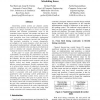Free Online Productivity Tools
i2Speak
i2Symbol
i2OCR
iTex2Img
iWeb2Print
iWeb2Shot
i2Type
iPdf2Split
iPdf2Merge
i2Bopomofo
i2Arabic
i2Style
i2Image
i2PDF
iLatex2Rtf
Sci2ools
RTSS
2002
IEEE
2002
IEEE
Improving Quality-of-Control Using Flexible Timing Constraints: Metric and Scheduling Issues
Closed-loop control systems are dynamic systems subject to perturbations. One of the main concerns of the control is to design controllers to correct or limit the deviation that transient perturbations cause in the controlled system response. The smaller and shorter the deviation, the better the achieved performance. However, such controllers have been traditionally implemented using fixed timing constraints (periods and deadlines). This precludes controllers to execute dynamically, accordingly to the system dynamics, which may lead to sub-optimal implementations: although higher execution rates may be preferable when reacting to perturbations in order to minimize the response deviations, they imply wastage of resources when the system is in equilibrium. In this paper we argue and demonstrate that the responsibility of maximizing the performance of closedloop systems relies on both the controller designer and the scheduler. We show that the dynamic optimization of the quality of the c...
Related Content
| Added | 15 Jul 2010 |
| Updated | 15 Jul 2010 |
| Type | Conference |
| Year | 2002 |
| Where | RTSS |
| Authors | Pau Martí, Josep M. Fuertes, Gerhard Fohler, Krithi Ramamritham |
Comments (0)

